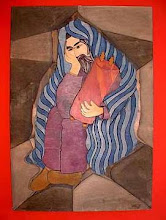Paul Eidelberg
Back in 1920, an event took place in Israel that redounds to the honor and courage of many Jews, secular and religious. Indeed, since these Jews were then subject to British rule, their noble conduct shines all the more brilliantly when contrasted to the behavior of many Jews in the supposedly sovereign state of Israel—and I have especially in mind Israel’s ruling elites.
The event is recorded in Dr. Joseph B. Shechtman’s excellent biography of Vladimir Jabotinsky, from which I shall quote and paraphrase.
At the end of 1919, Jabotinsky formed the Jewish Defense Corp (Haganah) in reaction to Arab violence. On April 4, an Arab mob, inflamed by anti-Jewish speeches, began attacking Jews in Jerusalem. “Soon Jewish blood was shed and the mob rushed into the Jewish quarter to kill and to pillage, shouting: “El Dowleh ma’ana (the government is with us).”
“Instead of assisting the victims, Arab police either adopted a passive attitude or joined the attackers. The pogrom lasted two days and resulted in five Jews and four Arabs killed, 211 Jews and 21 Arabs wounded; two Jewish girls were raped.”
The only part of Jerusalem affected by the riots was the Jewish quarter in the Old City, where Orthodox Jews refused to permit Jabotinsky’s Jewish Self-Defense Corp to operate. All other quarters of the City were guarded by Jewish patrols, with the result that not one casualty occurred in these areas.
“Hardly was the pogrom over when the British administration started reprisals against the Jewish defenders of Jerusalem.” Twenty Haganah members were arrested, including Jabotinsky. The men were brought into an interrogation room, where they were surrounded by Arab guards with Turkish lashes in their hands.
On the order of the judge (an Australian captain), an Arab secretary started the investigation by addressing Jabotinsky in Arabic: “What is your name?” There was no answer. The question was repeated in French: Votre nom, Monsieur? No answer. Finally in English: “Will you please tell me your name?” No answer.
The judge lost patience, banged on the table and angrily shouted: “Why don’t you answer?”
Turning to the judge, Jabotinsky said quietly but firmly: “Your honor! I shall not answer a court secretary who belongs to the tribe of the murderers whose attacks upon innocent people, coupled with pillage and raping, are still going on beyond these walls. Furthermore, I shall answer no questions unless they are asked in Hebrew, my language, the language of the Land of Israel and the language of my nineteen comrades.”
“There are no nationalities in the Court; there are only officials,” the judge sternly admonished him.
“If this is the case, I shall not reply to this official,” was the composed answer.
“Take him out of the room,” ordered the judge.
This was quickly done. But the remaining prisoners firmly clung to Jabotinsky’s policy. The Court adjourned. Two hours later they were summoned again; a Jewish sergeant, speaking English and Hebrew, was in the secretary’s chair and his opening question was in Hebrew” “Mah Sh’meicha?” (What’s your name?).
But this is not all. We read in the sequel: “The Jews of Jerusalem learned that Jabotinsky and his comrades ... were committed for trial, on Sabbath, April 10th. The same day, three hundred-eighty members of the Defense Corp who had not been arrested, signed a petition to the Court declaring themselves at one with the twenty arrested men and asking to be tried together with them.
“Simultaneously, in all synagogues signatures were collected under a petition expressing full solidarity with Jabotinsky and stating that, although the signatories had not been in a position to participate in the Self-Defense Corp, they would have done so, had it been possible. The Chief Rabbi of Jerusalem, Rabbi Kook, was the first to sign the petition and authorized its signing on the Sabbath by others.
“Two thousand five hundred Jews signed, among them three hundred women who stated they had been urging their husbands, brothers, sons to join the self-defense. The petition was submitted to the Military Court, but was disregarded.”
Jabotinsky and his comrades were tried, found guilty, and sentenced to fifteen years penal servitude—this, for defending Jewish life and Jewish honor against murderous and rapacious Arabs! Indignation seized the Jews in Jerusalem and all the suburbs. Haaretz reported on April 20: “All the schools, institutions, shops, etc. are closed. Nobody on the streets; no trading, no newspapers, nothing. A total strike.” The Rabbinate proclaimed the 26th of April a day of general strike, fast, and mourning, with the sounding of the Shofar in all synagogues in the country. (What would happen in Israel if such a strike were called today?)
When news about the vindictive sentence reached London, a storm of public indignation was aroused. Members the House of Commons were embarrassed, for Jabotinsky had served as an officer in the British army during World War I, indeed, had organized the Jewish Legion that fought on the side of the allies.
On July 8th, the High Commissioner of Palestine, Sir Herbert Samuel, issued an amnesty for all those imprisoned in connection with the Jerusalem riots, including two Arab rapists! Instead of being exonerated as he had insisted, Jabotinsky and his comrades were placed on the same level as Arab rapists and pogromists! He bitterly protested, but in vain.
A bright episode in Jewish history was thus dimmed by what we now call “moral equivalence.” But the Jewish pride and courage displayed by Jabotinsky, his comrades, and his 2,500 supporters—let us again mention Rav Kook—should serve to inspire Jews today confronted, as they are, not only by bloodthirsty Arabs, but by a shameless and pusillanimous government at war with heritage of the Jewish people.
Jewish Optimism and the Holiday of the Trees
-
Here is a Dry Bones cartoon about Tu B'Shvat, the holiday of the Trees,
from 1997. It falls on February 2nd this year.
I am going to post the whole blo...
2 hours ago




















No comments:
Post a Comment